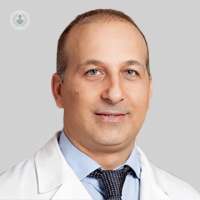Sacral stimulation for faecal incontinence
Written by:Fecal incontinence is the inability or difficulty to retain feces and gases, which usually manifests involuntarily and at unwanted. It can happen occasionally or consistently and is of important affectation and limitation of personal, social and work life.
Causes of fecal incontinence
The most common cause is the trauma to the anal sphincter induced vaginal delivery which can cause injury or weakness of the muscles that control defecation. The stress of childbirth can also cause damage to the sphincter nerve structures.
Incontinence can occur at birth or later after many years, when other factors or simply the physiological aging muscle and ligamentous structures of the pelvis due to age are added.
Other possible causes are surgery for anal fistula, hemorrhoids and fissure surgery for rectal cancer, rectal prolapse, rectocele, anal trauma, neurological diseases such as multiple sclerosis and diseases metabolic like diabetes that can affect the nervous system.
Management of faecal incontinence
Mild fecal incontinence can be treated with diet modifications, fiber or drugs that increase stool consistency and antidiarrheal drugs. Another type medical treatment is biofeedback which is in the process of rehabilitation of the anal and anorectal function.
In cases that do not respond to medical treatment, there is a minimally invasive surgical option for the injection of products to increase the thickness of the anal sphincter. In the presence of lesions of the muscles of the anus, surgical repair may be necessary.
In more severe cases and no severe cases when other treatments have not provided benefits, even in patients with rupture of the anal sphincter, A highly effective treatment is the stimulation of sacral roots. The colostomy, which is to make a unnatural anus with the large intestine through the abdominal wall, is a last resort and, nowadays, is a rare treat.
Sacral Stimulation as a treatment
The stimulation of sacral roots or neuromudulacion a most innovative minimally invasive surgical treatment can be done with local anesthesia. The procedure involves electrically stimulating the sacral nerve that controls the anal sphincter using an electrode connected to a pulse generator that works like a pacemaker and is implanted in the buttock.
Over time, a re- education of neurological circuits that control the anal function and defecation activity occurs. For patients with double, fecal and urinary incontinence, usually accomplished correct both problems. The placement of the device is performed after a trial period that is used to assess treatment efficacy.



